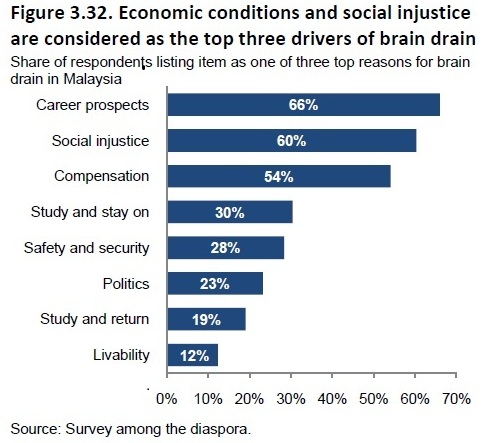April 3o, 2011
World Bank Brain Drain Report: Useless and Politically Motivated?
Report from Shannon Teoh (The Malaysian Insider)
 ALOR STAR, April 30 – Tun Dr Mahathir Mohamad described the World Bank as “useless”, saying today that it was politically motivated for putting out a report that pro-Bumiputera policies are stunting the country’s economy.
ALOR STAR, April 30 – Tun Dr Mahathir Mohamad described the World Bank as “useless”, saying today that it was politically motivated for putting out a report that pro-Bumiputera policies are stunting the country’s economy.
The former prime minister said the World Bank report was politically motivated as it wanted a change of prime minister, seemingly referring to Opposition Leader Datuk Seri Anwar Ibrahim, a former chairman of its development committee.
“We have been critical of the World Bank since my time. We said that they were useless. “They dislike us and want to have their good friend become prime minister,” Dr Mahathir (picture) told reporters today.
dislike us and want to have their good friend become prime minister,” Dr Mahathir (picture) told reporters today.
The World Bank said on Thursday that more than one million Malaysians live abroad as policies favouring the Malays are holding back the economy, causing a brain drain and limiting foreign investment.
World Bank senior economist Philip Schellekens was quoted as saying that foreign investment could be five times the current levels if the country had Singapore’s talent base.
He said Malaysian migration was increasingly becoming a skills migration with one-third of the one million-strong Malaysian diaspora now consisting of the tertiary educated and expected the trend to continue.
Prime Minister Datuk Seri Najib Razak has pledged to roll back the country’s pro-Malay policies from the New Economic Policy (NEP) but also told the UMNO assembly last year that the government’s social contract of providing benefits to Bumiputeras cannot be repealed.
According to the Bloomberg report, Najib has eased some rules to woo funds, including scrapping a requirement that foreign companies investing in Malaysia and locally listed businesses set aside 30 per cent of their Malaysian equity for indigenous investors.
Last year, he unveiled an economic transformation programme under which the government identified US$444 billion (RM1.3 trillion) of projects from mass rail transit to nuclear power that it would promote in the current decade.
However, Dr Mahathir said today that while it liberalised the economy, the government should “be fair to the poor and make sure that they have opportunities as well.”














